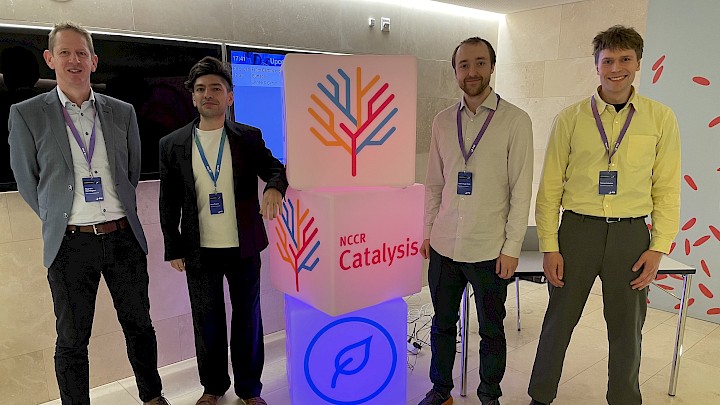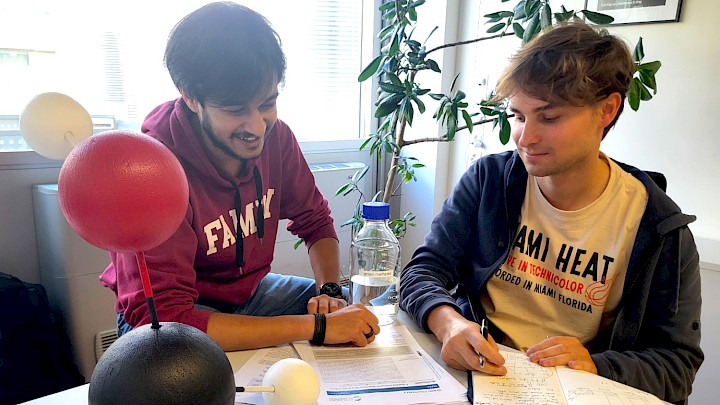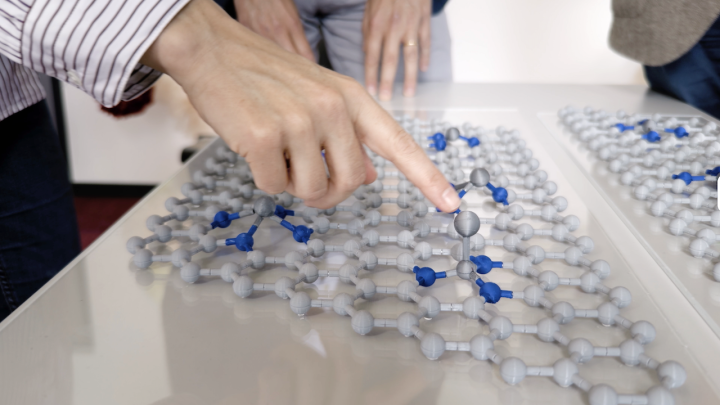

25.2.2026

Two Labs, One Team: A Chemoenzymatic Story
Team portrait, from left to right: Nicolas Imstepf, Adriana Neves Vieira.
At the end of 2025, two researchers from ZHAW and ETH Zürich participated in a lab exchange, where they each spent time in the other's lab, working together on their joint project through the NCCR Catalysis Catalyzer Program. Meet Adriana Neves Vieira, a recipient of the 2025 Talent Program in Catalysis and Sustainable Chemistry, and Nicolas Impstef, a recipient of the 2022 NCCR Catalysis Young Talents Fellowship, as they describe their experience!
Hi Adriana and Nicolas, could you tell us about yourselves and your research within NCCR Catalysis?
Adriana: I come from Portugal and grew up in Neuchâtel. I then moved to Lausanne, where I completed my Bachelor’s and Master’s degrees in Molecular and Biological Chemistry at EPFL. I continued my training by joining the Morandi group as a PhD student to develop new catalytic methods for organic synthesis. I have been collaborating with Nicolas and Prof. Buller to develop a cooperative chemoenzymatic system. In parallel, I also focus my research on developing new uses for phosphonium salts.
Nicolas: I grew up in a small village in the canton of Valais and started my career with an apprenticeship as a chemical laboratory technician at Lonza. I subsequently earned a Bachelor’s degree in Chemistry and a Master’s degree in Computational Life Sciences from the ZHAW. Since 2023, I have been a PhD student in the Buller group, where I focus on engineering enzymes for next-generation industrial biocatalysis. In our collaborative chemoenzymatic project, Adriana leads the chemical aspects, while I contribute specialized expertise in biocatalysis and enzyme engineering.
How did the collaboration between the Morandi and Buller groups emerge?
Adriana & Nicolas: The collaboration began during the preparation of Phase II of the NCCR Catalysis, when Prof. Buller and Prof. Morandi jointly proposed the project's core idea. At the same time, Adriana began her PhD in the Morandi group and expressed interest in a collaborative project that aligned well with the Phase II timeline. This led to a joint brainstorming session involving all four researchers, during which the project took shape and evolved into its current form.
Adriana and Nicolas in the Morandi lab at ETHZ (left), and Adriana in the Buller lab at ZHAW (right).
You recently conducted a tandem lab exchange between ZHAW and ETH Zürich. How did the exchange benefit you as researchers and impact the project?
Adriana: It has been an amazing opportunity for me to practice interdisciplinary collaboration. This reflects what happens in industry, where I am heading, where most projects include members with very diverse backgrounds. I could develop my leadership and communication skills as well as my understanding of biochemical lab work.
Nicolas: The collaboration exposed me to a different academic culture and strengthened my critical thinking by encouraging me to approach problems from new perspectives. A decade after completing my apprenticeship, the exchange also served as a valuable refresher in organic chemistry and provided deeper insight into advanced experimental techniques.
Adriana & Nicolas: At the beginning of the collaboration, we faced natural challenges: the partner lab’s organization and workflows were unfamiliar, with different methods and corresponding problems. This lack of shared context made it difficult to contribute ideas that were both relevant and technically feasible. Without a clear understanding of how their research was conducted, even well-intentioned input risked being impractical or misaligned.
Through developing a deeper understanding of our partners’ work and maintaining open, continuous communication, we were able to anticipate challenges early, align expectations, and collaboratively develop effective solutions rather than simply merging results. Daily exchanges during these weeks enabled efficient idea sharing, faster progress, and a shared perspective on the project, ultimately strengthening both its direction and the quality of the research.
Adriana and Nicolas with NCCR Catalysis colleagues from the Buller and Benin groups at the photo booth at the NCCR Catalysis Annal Meeting 2025.
What advice would you give other early-career researchers on collaborations and exchanges between labs?
Adriana & Nicolas: Take the opportunity to visit other laboratories! You learn about a new field from passionate researchers, and you can share your own passion with someone eager to learn. In addition, you will also gain more insight into your own field, since your collaborator will ask questions about information that you took for granted.
What did you learn from hosting your colleague in your lab?
Adriana & Nicolas: It made us aware of different working styles. The colleague's arrival burst the scientific bubble we had been in, since we had quickly gotten used to our own laboratory's working habits. We got a different perspective that helped us realise what we had overlooked as good organizational features. It also made us aware of areas that could be improved, to make our PhD stay better and healthier.
What was surprising about your experience in the other lab?
Adriana: I had the misconception that enzymes are fragile at temperatures far from 37°C and in the presence of water as a solvent. I was surprised to learn that they can be used in so many different conditions and for many different substrates. I was impressed by the high-throughput methods used in biocatalysis and, as a consequence, by the amount of data that bioinformaticians need to handle.
Nicolas: One of the most surprising aspects of my experience in the Morandi lab was the versatility of the research areas and the level of independence given to researchers. PhD students were encouraged to choose and shape their own research projects, fostering a strong sense of ownership and motivation. This combination of diversity and independence made the lab environment both empowering and inspiring.
Nicolas, Adriana and Stefan in a Zoom call between the Buller, Morandi and Jorner groups.
What will be the next steps in your collaboration?
Adriana & Nicolas: To accelerate the identification of a functional system, we expanded our collaboration to include Stefan Schmid, another member of NCCR Catalysis (Jorner group), who brings expertise in computational chemistry. His work employs Bayesian optimization to guide reaction optimization and efficiently steer the system toward product formation. In parallel, we are extending the developed model system to more complex substrates such as hormones.
Thank you so much for sharing your experience! We wish you continued success in your project.
Learn more about Adriana's research here, and connect with her on LinkedIn. Learn more about Nicolas' research here, and connect with him on LinkedIn.
At the end of 2025, two researchers from ZHAW and ETH Zürich participated in a lab exchange, where they each spent time in the other's lab, working together on their joint project through the NCCR Catalysis Catalyzer Program. Meet Adriana Neves Vieira, a recipient of the 2025 Talent Program in Catalysis and Sustainable Chemistry, and Nicolas Impstef, a recipient of the 2022 NCCR Catalysis Young Talents Fellowship, as they describe their experience!
Hi Adriana and Nicolas, could you tell us about yourselves and your research within NCCR Catalysis?
Adriana: I come from Portugal and grew up in Neuchâtel. I then moved to Lausanne, where I completed my Bachelor’s and Master’s degrees in Molecular and Biological Chemistry at EPFL. I continued my training by joining the Morandi group as a PhD student to develop new catalytic methods for organic synthesis. I have been collaborating with Nicolas and Prof. Buller to develop a cooperative chemoenzymatic system. In parallel, I also focus my research on developing new uses for phosphonium salts.
Nicolas: I grew up in a small village in the canton of Valais and started my career with an apprenticeship as a chemical laboratory technician at Lonza. I subsequently earned a Bachelor’s degree in Chemistry and a Master’s degree in Computational Life Sciences from the ZHAW. Since 2023, I have been a PhD student in the Buller group, where I focus on engineering enzymes for next-generation industrial biocatalysis. In our collaborative chemoenzymatic project, Adriana leads the chemical aspects, while I contribute specialized expertise in biocatalysis and enzyme engineering.
How did the collaboration between the Morandi and Buller groups emerge?
Adriana & Nicolas: The collaboration began during the preparation of Phase II of the NCCR Catalysis, when Prof. Buller and Prof. Morandi jointly proposed the project's core idea. At the same time, Adriana began her PhD in the Morandi group and expressed interest in a collaborative project that aligned well with the Phase II timeline. This led to a joint brainstorming session involving all four researchers, during which the project took shape and evolved into its current form.
Adriana and Nicolas in the Morandi lab at ETHZ (left), and Adriana in the Buller lab at ZHAW (right).
You recently conducted a tandem lab exchange between ZHAW and ETH Zürich. How did the exchange benefit you as researchers and impact the project?
Adriana: It has been an amazing opportunity for me to practice interdisciplinary collaboration. This reflects what happens in industry, where I am heading, where most projects include members with very diverse backgrounds. I could develop my leadership and communication skills as well as my understanding of biochemical lab work.
Nicolas: The collaboration exposed me to a different academic culture and strengthened my critical thinking by encouraging me to approach problems from new perspectives. A decade after completing my apprenticeship, the exchange also served as a valuable refresher in organic chemistry and provided deeper insight into advanced experimental techniques.
Adriana & Nicolas: At the beginning of the collaboration, we faced natural challenges: the partner lab’s organization and workflows were unfamiliar, with different methods and corresponding problems. This lack of shared context made it difficult to contribute ideas that were both relevant and technically feasible. Without a clear understanding of how their research was conducted, even well-intentioned input risked being impractical or misaligned.
Through developing a deeper understanding of our partners’ work and maintaining open, continuous communication, we were able to anticipate challenges early, align expectations, and collaboratively develop effective solutions rather than simply merging results. Daily exchanges during these weeks enabled efficient idea sharing, faster progress, and a shared perspective on the project, ultimately strengthening both its direction and the quality of the research.
Adriana and Nicolas with NCCR Catalysis colleagues from the Buller and Benin groups at the photo booth at the NCCR Catalysis Annal Meeting 2025.
What advice would you give other early-career researchers on collaborations and exchanges between labs?
Adriana & Nicolas: Take the opportunity to visit other laboratories! You learn about a new field from passionate researchers, and you can share your own passion with someone eager to learn. In addition, you will also gain more insight into your own field, since your collaborator will ask questions about information that you took for granted.
What did you learn from hosting your colleague in your lab?
Adriana & Nicolas: It made us aware of different working styles. The colleague's arrival burst the scientific bubble we had been in, since we had quickly gotten used to our own laboratory's working habits. We got a different perspective that helped us realise what we had overlooked as good organizational features. It also made us aware of areas that could be improved, to make our PhD stay better and healthier.
What was surprising about your experience in the other lab?
Adriana: I had the misconception that enzymes are fragile at temperatures far from 37°C and in the presence of water as a solvent. I was surprised to learn that they can be used in so many different conditions and for many different substrates. I was impressed by the high-throughput methods used in biocatalysis and, as a consequence, by the amount of data that bioinformaticians need to handle.
Nicolas: One of the most surprising aspects of my experience in the Morandi lab was the versatility of the research areas and the level of independence given to researchers. PhD students were encouraged to choose and shape their own research projects, fostering a strong sense of ownership and motivation. This combination of diversity and independence made the lab environment both empowering and inspiring.
Nicolas, Adriana and Stefan in a Zoom call between the Buller, Morandi and Jorner groups.
What will be the next steps in your collaboration?
Adriana & Nicolas: To accelerate the identification of a functional system, we expanded our collaboration to include Stefan Schmid, another member of NCCR Catalysis (Jorner group), who brings expertise in computational chemistry. His work employs Bayesian optimization to guide reaction optimization and efficiently steer the system toward product formation. In parallel, we are extending the developed model system to more complex substrates such as hormones.
Thank you so much for sharing your experience! We wish you continued success in your project.
Learn more about Adriana's research here, and connect with her on LinkedIn. Learn more about Nicolas' research here, and connect with him on LinkedIn.
14.1.2026

Symposium on Data-driven Approaches in X-ray Absorption Spectroscopy
The organizers of DataXAS 2026, Maarten Nachtegaal, Aram Bugaev, Adam Clark and Tomas Aidukas, at the event.
DataXAS 2026, the Symposium on Data-Driven Approaches in X-ray Absorption Spectroscopy, was an inspiring way to kick off the new year! Organized by NCCR Catalysis members Adam Clark, Aram Bugaev, and Maarten Nachtegaal, together with their colleague Tomas Aidukas, the NCCR Catalysis-sponsored symposium took place at the snow-covered ETH Hönggerberg campus on 5-6 January 2026.
The symposium brought together researchers from across the world. It featured talks on data-driven decomposition and spectral extraction; machine learning for XAS prediction and analysis; advanced approaches to EXAFS analysis; and bridging simulations and experiments with machine learning.
Group photo at DataXAS at ETH Hönggerberg
In addition to international guest speakers, NCCR Catalysis PI Teodoro Laino delivered the opening keynote on the outlook for machine learning in spectroscopy and reproducible data.
Angelo Bellia, an NCCR Catalysis PhD student in the group of Christoph Müller, felt that “the symposium was very stimulating and provided a unique opportunity to interact with experts working to take XAS to the next level. It was exciting to see how this work is already shaping tools and approaches that will benefit the next generation of researchers!”
Andrea Ruiz Ferrando, an NCCR Catalysis postdoc in the group of Javier Pérez-Ramírez found that “the symposium reinforced the idea that data science is becoming a key lever for extracting deeper insight from XAS, beyond experimental advances alone. What made it particularly compelling was the strong collaborative spirit, with many open tools and shared workflows shaping how the community moves forward.”
With such stimulating presentations and scientific discussions, we couldn’t think of a better way to start 2026!
DataXAS 2026, the Symposium on Data-Driven Approaches in X-ray Absorption Spectroscopy, was an inspiring way to kick off the new year! Organized by NCCR Catalysis members Adam Clark, Aram Bugaev, and Maarten Nachtegaal, together with their colleague Tomas Aidukas, the NCCR Catalysis-sponsored symposium took place at the snow-covered ETH Hönggerberg campus on 5-6 January 2026.
The symposium brought together researchers from across the world. It featured talks on data-driven decomposition and spectral extraction; machine learning for XAS prediction and analysis; advanced approaches to EXAFS analysis; and bridging simulations and experiments with machine learning.
Group photo at DataXAS at ETH Hönggerberg
In addition to international guest speakers, NCCR Catalysis PI Teodoro Laino delivered the opening keynote on the outlook for machine learning in spectroscopy and reproducible data.
Angelo Bellia, an NCCR Catalysis PhD student in the group of Christoph Müller, felt that “the symposium was very stimulating and provided a unique opportunity to interact with experts working to take XAS to the next level. It was exciting to see how this work is already shaping tools and approaches that will benefit the next generation of researchers!”
Andrea Ruiz Ferrando, an NCCR Catalysis postdoc in the group of Javier Pérez-Ramírez found that “the symposium reinforced the idea that data science is becoming a key lever for extracting deeper insight from XAS, beyond experimental advances alone. What made it particularly compelling was the strong collaborative spirit, with many open tools and shared workflows shaping how the community moves forward.”
With such stimulating presentations and scientific discussions, we couldn’t think of a better way to start 2026!
8.12.2025

NCCR Catalysis Trailblazers: Vera Giulimondi
For our third Trailblazers feature, meet Vera Giulimondi! A recent graduate from Prof. Javier Pérez-Ramírez’ group at ETH Zurich, she won the EFCATS Best PhD Award, which was presented at EuropaCat 2025 in Trondheim! Fascinated by science and chemistry from a young age, she is a scientist at heart and was involved in multiple collaborations in academia and with industry.
Congratulations on the important recognition of your PhD work, Vera! Could you tell us about yourself and your research within NCCR Catalysis?
Within NCCR Catalysis, I was a PhD student in Prof. Javier Pérez-Ramírez’s group at ETH Zurich, working on tailoring heterogeneous catalysts with atomic precision to make chemical technologies more sustainable. Most recently, I studied platinum single-atom catalysts as replacements for toxic mercury-based catalysts in acetylene hydrochlorination, a key process in producing PVC plastic in China. My aim was to understand how platinum single-atom catalysts work and tune their structure to bring lab-developed materials closer to commercialization.
Vera setting up an automated catalyst synthesis procedure. © NCCR Catalysis
What made you consider a career in science, and what/who got you interested in science in the first place?
My career path was shaped by both my family and education. My parents always encouraged me to explore science as a child and gifted me a little alchemist set. I fell in love with it and spent days mixing things, watching colors swirl, or even making miniature explosions! But this childhood passion could only evolve into a career path thanks to dedicated teachers and professors who helped make chemistry and engineering accessible, understandable, and even more captivating.
Where are you from, and what is your background?
I’m from Italy and moved to Switzerland for my Master’s in Chemical Engineering at EPFL. I was attracted to the international environment in Swiss universities and the diverse offerings in chemistry, materials science, engineering, and sustainability. During my studies, I interned in the R&D department of a watch manufacturing company, where I saw firsthand how chemistry and materials science are applied in the industry. I also had the opportunity to conduct my Master’s thesis in the United States, focusing on electrocatalysis for CO2 reduction. This experience sparked a keen passion for catalytic technologies, which led me to join the aCe group of Prof. Javier Pérez-Ramírez at ETH Zurich.
What value has NCCR Catalysis brought to you as an early-career researcher?
NCCR Catalysis is a cradle of ideas! As a PhD student, exposure to various aspects of catalysis is an excellent stimulus for one’s research. I was able to collaborate with researchers of diverse expertise, from advanced spectroscopy to computational analyses and life-cycle assessments, respectively, with the groups of Prof. Gunnar Jeschke, Prof. Maarten Nachtegaal, Prof. Núria López and Prof. Gonzalo Guillén-Gosálbez. These interdisciplinary studies helped me gain insight into multiscale questions, from atomic-level phenomena to the economic and environmental impact of the catalytic technology we are developing.
From a personal perspective, but not of lesser importance, these collaborations have fostered lasting connections and friendships.
Vera at the NCCR Catalysis Annual Event 2022 (left) and the Annual Retreat 2023 (right). © NCCR Catalysis
What did you learn from working with industry during your PhD?
It provided valuable insights into translating fundamental science into practical solutions, considering scalability, cost-efficiency, and sustainability. A key focus of my work was highlighting the importance of toxicity analyses in early-stage catalyst development, which is essential for ensuring that the manufacturing of the new catalyst is benign to human health and the environment.
What have been your personal highlights of your time as a doctoral researcher?
A highlight of my PhD was conducting synchrotron experiments on single metal atom catalysts under reaction conditions. The challenge was bringing highly corrosive chemistry, involving halogens for vinyl chloride synthesis, to the synchrotron, requiring careful experiment design and safety assessments. Additionally, the experiments had to be completed within a tight timeframe. Overcoming these hurdles provided unique insights into catalyst behavior, making it a highly rewarding experience.
Furthermore, having the opportunity to present my results at conferences like EuropaCat 2023 in Prague, made possible by the SCNAT Chemistry Travel Award, further enriched my research through stimulating discussions and fresh perspectives.
Vera at the EuropaCat2023 conference with colleagues from the aCe research group (©). From left to right: Dr. Antonio Martín, Prof. Javier Pérez-Ramírez, Dr. Sharon Mitchell, Vera Giulimondi, and Ivan Surin.
What advice would you give other female early-career researchers in STEM?
My advice to women considering a PhD program in STEM is to choose a topic that sparks their interest and plan a clear roadmap with the help of mentors. Seek advisors who support you and challenge and stimulate your growth. Find a research environment that fosters your confidence, and consider international settings for diverse perspectives and less polarization. I also recommend joining associations and have found tremendous value in participating in events organized by women in science societies, which offer networking opportunities and inspiration from fellow female researchers.
You completed your PhD studies. What will be your next adventure?
I truly enjoy delving into fundamental research, but I am equally intrigued by the prospect of applying this knowledge to practical ends. From laboratory experimentation to commercialization, research is vital for driving innovation across different stages of development. Looking forward, I am eager to leverage the skills I have developed in my PhD studies and contribute to advancing chemical technologies for greater efficiency and sustainability.
Thank you so much for sharing your experience! Congratulations again, and we wish you the very best for your next steps.
Learn more about Vera’s research here and here, and connect with her on LinkedIn.
Congratulations on the important recognition of your PhD work, Vera! Could you tell us about yourself and your research within NCCR Catalysis?
Within NCCR Catalysis, I was a PhD student in Prof. Javier Pérez-Ramírez’s group at ETH Zurich, working on tailoring heterogeneous catalysts with atomic precision to make chemical technologies more sustainable. Most recently, I studied platinum single-atom catalysts as replacements for toxic mercury-based catalysts in acetylene hydrochlorination, a key process in producing PVC plastic in China. My aim was to understand how platinum single-atom catalysts work and tune their structure to bring lab-developed materials closer to commercialization.
Vera setting up an automated catalyst synthesis procedure. © NCCR Catalysis
What made you consider a career in science, and what/who got you interested in science in the first place?
My career path was shaped by both my family and education. My parents always encouraged me to explore science as a child and gifted me a little alchemist set. I fell in love with it and spent days mixing things, watching colors swirl, or even making miniature explosions! But this childhood passion could only evolve into a career path thanks to dedicated teachers and professors who helped make chemistry and engineering accessible, understandable, and even more captivating.
Where are you from, and what is your background?
I’m from Italy and moved to Switzerland for my Master’s in Chemical Engineering at EPFL. I was attracted to the international environment in Swiss universities and the diverse offerings in chemistry, materials science, engineering, and sustainability. During my studies, I interned in the R&D department of a watch manufacturing company, where I saw firsthand how chemistry and materials science are applied in the industry. I also had the opportunity to conduct my Master’s thesis in the United States, focusing on electrocatalysis for CO2 reduction. This experience sparked a keen passion for catalytic technologies, which led me to join the aCe group of Prof. Javier Pérez-Ramírez at ETH Zurich.
What value has NCCR Catalysis brought to you as an early-career researcher?
NCCR Catalysis is a cradle of ideas! As a PhD student, exposure to various aspects of catalysis is an excellent stimulus for one’s research. I was able to collaborate with researchers of diverse expertise, from advanced spectroscopy to computational analyses and life-cycle assessments, respectively, with the groups of Prof. Gunnar Jeschke, Prof. Maarten Nachtegaal, Prof. Núria López and Prof. Gonzalo Guillén-Gosálbez. These interdisciplinary studies helped me gain insight into multiscale questions, from atomic-level phenomena to the economic and environmental impact of the catalytic technology we are developing.
From a personal perspective, but not of lesser importance, these collaborations have fostered lasting connections and friendships.
Vera at the NCCR Catalysis Annual Event 2022 (left) and the Annual Retreat 2023 (right). © NCCR Catalysis
What did you learn from working with industry during your PhD?
It provided valuable insights into translating fundamental science into practical solutions, considering scalability, cost-efficiency, and sustainability. A key focus of my work was highlighting the importance of toxicity analyses in early-stage catalyst development, which is essential for ensuring that the manufacturing of the new catalyst is benign to human health and the environment.
What have been your personal highlights of your time as a doctoral researcher?
A highlight of my PhD was conducting synchrotron experiments on single metal atom catalysts under reaction conditions. The challenge was bringing highly corrosive chemistry, involving halogens for vinyl chloride synthesis, to the synchrotron, requiring careful experiment design and safety assessments. Additionally, the experiments had to be completed within a tight timeframe. Overcoming these hurdles provided unique insights into catalyst behavior, making it a highly rewarding experience.
Furthermore, having the opportunity to present my results at conferences like EuropaCat 2023 in Prague, made possible by the SCNAT Chemistry Travel Award, further enriched my research through stimulating discussions and fresh perspectives.
Vera at the EuropaCat2023 conference with colleagues from the aCe research group (©). From left to right: Dr. Antonio Martín, Prof. Javier Pérez-Ramírez, Dr. Sharon Mitchell, Vera Giulimondi, and Ivan Surin.
What advice would you give other female early-career researchers in STEM?
My advice to women considering a PhD program in STEM is to choose a topic that sparks their interest and plan a clear roadmap with the help of mentors. Seek advisors who support you and challenge and stimulate your growth. Find a research environment that fosters your confidence, and consider international settings for diverse perspectives and less polarization. I also recommend joining associations and have found tremendous value in participating in events organized by women in science societies, which offer networking opportunities and inspiration from fellow female researchers.
You completed your PhD studies. What will be your next adventure?
I truly enjoy delving into fundamental research, but I am equally intrigued by the prospect of applying this knowledge to practical ends. From laboratory experimentation to commercialization, research is vital for driving innovation across different stages of development. Looking forward, I am eager to leverage the skills I have developed in my PhD studies and contribute to advancing chemical technologies for greater efficiency and sustainability.
Thank you so much for sharing your experience! Congratulations again, and we wish you the very best for your next steps.
Learn more about Vera’s research here and here, and connect with her on LinkedIn.
21.11.2025

Behind The Publication: A feasible methanol economy for a green future
Abhinandan Nabera and Hidde Kolmeijer discussing the results of the team's methanol economy study.
In a recent publication, NCCR Catalysis researchers highlight methanol’s potential to transform the economy towards a cleaner, more sustainable future. Learn more about the work in this Behind The Publication feature!
What is the methanol economy, and what is the motivation of this work?
The methanol economy, first proposed by Nobel laureate George Olah, envisions using methanol as a clean and versatile alternative to fossil feedstocks such as gasoline, natural gas, and naphtha, which are used today to produce fuels and chemicals. Methanol can not only power vehicles, ships, and planes, but also serve as a key building block for producing a wide range of chemicals. Crucially, it can be synthesized from renewable sources such as biomass, biogas, or even captured CO2 from the air. This NCCR Catalysis study expands on Olah’s vision by providing the first quantitative assessment of a methanol‑based economy by 2050, identifying the most effective pathways to realize it. The goal is to clarify the true environmental and economic potential of methanol as a foundation for a sustainable society.
Overview of the proposed methanol economy. Methanol produced from fossil or renewable sources can be used across several sectors. It serves as a chemical feedstock and as a fuel for road transport and shipping, and can also be converted into jet fuel through the methanol-to-kerosene process for use in aviation.
Which was the main challenge? How did you address it?
The main challenge was to move beyond the community’s qualitative optimism about the methanol economy and develop a rigorous, quantitative assessment under realistic future conditions spanning entire sectors of the economy, such as fuels for transport and chemicals. Achieving this required several years of work, as we integrated previously developed partial models into a comprehensive 2050 framework that links methanol production and use pathways with prospective life-cycle assessment and techno‑economic analyses. This allowed us to evaluate numerous configurations, consider different renewable carbon sources, account for the limited availability of bio‑based feedstocks, and compare all options on a consistent basis.
What are the study’s main results and take-home messages?
The formal aspects of the analysis may be complex, but the results are clear. A methanol economy could significantly cut global greenhouse gas emissions while remaining broadly affordable by 2050. Specifically, producing methanol from biomass and biogas can reach net‑zero or even negative emissions, though these resources alone are insufficient to meet the projected methanol demand. By combining these bio‑based routes with CO2 hydrogenation technologies, a fully renewable pathway emerges; one capable of net‑zero emissions at an estimated cost of about US$ 32 per person per month. This is comparable to other 2°C scenarios under the Paris Agreement, or, put more simply, to the price of a subscription to a good-quality streaming service. We could also identify the order in which implementation would be more beneficial: rapid adoption in road transport and chemicals, followed by aviation and shipping. One key takeaway is the importance of continued investment in CO2 hydrogenation technologies to ensure they reach commercial maturity.
Key findings of the evaluated methanol economy scenarios. The analysis identifies two viable pathways, both reliant on biomass and biogas feedstocks due to their comparatively low costs and substantial CO2 emission reductions. In the bio + CO2 scenario, the methanol economy achieves net-zero emissions at an estimated cost of US$ 32 per capita per month. Alternatively, a fossil-based pathway remains feasible at approximately half the cost, albeit with higher residual emissions.
What makes this work particularly relevant for NCCR Catalysis and the research community?
The study demonstrates that CO2 hydrogenation to methanol is essential to overcoming the limited supply of sustainable biomass and biogas, enabling a fully renewable methanol economy with net‑zero greenhouse gas emissions. This directly aligns with the NCCR Catalysis vision of sustainable, carbon‑neutral value chains, in which the development of advanced catalytic systems for CO2 conversion is a central pillar. Our findings also show that the methanol economy is a practical pathway to meet global climate commitments. We hope these results will energize the scientific community and encourage dialogue among researchers, industrialists, and policymakers toward their real-world implementation.
Publication details:
A feasible methanol economy for a green future. H. Kolmeijer, A. Nabera, A.J. Martín, G. Guillén-Gosálbez, J. Pérez-Ramírez. Green Chem. 2025. DOI: 10.1039/d5gc04615g.
In a recent publication, NCCR Catalysis researchers highlight methanol’s potential to transform the economy towards a cleaner, more sustainable future. Learn more about the work in this Behind The Publication feature!
What is the methanol economy, and what is the motivation of this work?
The methanol economy, first proposed by Nobel laureate George Olah, envisions using methanol as a clean and versatile alternative to fossil feedstocks such as gasoline, natural gas, and naphtha, which are used today to produce fuels and chemicals. Methanol can not only power vehicles, ships, and planes, but also serve as a key building block for producing a wide range of chemicals. Crucially, it can be synthesized from renewable sources such as biomass, biogas, or even captured CO2 from the air. This NCCR Catalysis study expands on Olah’s vision by providing the first quantitative assessment of a methanol‑based economy by 2050, identifying the most effective pathways to realize it. The goal is to clarify the true environmental and economic potential of methanol as a foundation for a sustainable society.
Overview of the proposed methanol economy. Methanol produced from fossil or renewable sources can be used across several sectors. It serves as a chemical feedstock and as a fuel for road transport and shipping, and can also be converted into jet fuel through the methanol-to-kerosene process for use in aviation.
Which was the main challenge? How did you address it?
The main challenge was to move beyond the community’s qualitative optimism about the methanol economy and develop a rigorous, quantitative assessment under realistic future conditions spanning entire sectors of the economy, such as fuels for transport and chemicals. Achieving this required several years of work, as we integrated previously developed partial models into a comprehensive 2050 framework that links methanol production and use pathways with prospective life-cycle assessment and techno‑economic analyses. This allowed us to evaluate numerous configurations, consider different renewable carbon sources, account for the limited availability of bio‑based feedstocks, and compare all options on a consistent basis.
What are the study’s main results and take-home messages?
The formal aspects of the analysis may be complex, but the results are clear. A methanol economy could significantly cut global greenhouse gas emissions while remaining broadly affordable by 2050. Specifically, producing methanol from biomass and biogas can reach net‑zero or even negative emissions, though these resources alone are insufficient to meet the projected methanol demand. By combining these bio‑based routes with CO2 hydrogenation technologies, a fully renewable pathway emerges; one capable of net‑zero emissions at an estimated cost of about US$ 32 per person per month. This is comparable to other 2°C scenarios under the Paris Agreement, or, put more simply, to the price of a subscription to a good-quality streaming service. We could also identify the order in which implementation would be more beneficial: rapid adoption in road transport and chemicals, followed by aviation and shipping. One key takeaway is the importance of continued investment in CO2 hydrogenation technologies to ensure they reach commercial maturity.
Key findings of the evaluated methanol economy scenarios. The analysis identifies two viable pathways, both reliant on biomass and biogas feedstocks due to their comparatively low costs and substantial CO2 emission reductions. In the bio + CO2 scenario, the methanol economy achieves net-zero emissions at an estimated cost of US$ 32 per capita per month. Alternatively, a fossil-based pathway remains feasible at approximately half the cost, albeit with higher residual emissions.
What makes this work particularly relevant for NCCR Catalysis and the research community?
The study demonstrates that CO2 hydrogenation to methanol is essential to overcoming the limited supply of sustainable biomass and biogas, enabling a fully renewable methanol economy with net‑zero greenhouse gas emissions. This directly aligns with the NCCR Catalysis vision of sustainable, carbon‑neutral value chains, in which the development of advanced catalytic systems for CO2 conversion is a central pillar. Our findings also show that the methanol economy is a practical pathway to meet global climate commitments. We hope these results will energize the scientific community and encourage dialogue among researchers, industrialists, and policymakers toward their real-world implementation.
Publication details:
A feasible methanol economy for a green future. H. Kolmeijer, A. Nabera, A.J. Martín, G. Guillén-Gosálbez, J. Pérez-Ramírez. Green Chem. 2025. DOI: 10.1039/d5gc04615g.
11.8.2025

Recipients of 2025 Young Talents Fellowship
We’re excited to announce the five recipients of our 2025 Young Talents Fellowship, who will begin their Master’s theses within our member groups in 2026. Congratulations and welcome to our network, Hanna, Mark, Anna-Maria, Neel, and Laurine!
Hanna Barta, from Hungary, studies Chemistry at the FAU Erlangen-Nürnberg, Germany, and will join Prof. Jieping Zhu’s group at EPFL.
Mark Soesanto, from Indonesia, studies Chemistry at ETH Zurich, where he will join the group of Prof. Erick M. Carreira.
Anna-Maria Ceccucci, from Italy, studies Chemical Engineering and Biotechnology at EPFL, and will join the groups of Prof. Kathrin Fenner at the University of Zurich/Eawag and Prof. Jeremy Luterbacher at EPFL.
Sharma Neel Omprakash, from India, studies Chemistry at the S.V. National Institute of Technology, India, and will join Prof. Rebecca Buller’s group at the University of Bern.
Laurine Palluaud, from France, studies Chemistry and Chemical Engineering at the National Graduate School of Chemistry of Montpellier, France, and will join Prof. Jérôme Waser’s group at EPFL.
The Young Talents Fellowship supports students with an exceptional academic record and potential, and diverse backgrounds. It provides them with the opportunity to conduct a Master’s thesis project in one or several research groups associated with NCCR Catalysis, and to establish their connections and ideas in a multidisciplinary, cross-fertilizing environment of research excellence. The first edition of this initiative to promote fair representation in sustainable chemistry research was launched in 2022.
Hanna Barta, from Hungary, studies Chemistry at the FAU Erlangen-Nürnberg, Germany, and will join Prof. Jieping Zhu’s group at EPFL.
Mark Soesanto, from Indonesia, studies Chemistry at ETH Zurich, where he will join the group of Prof. Erick M. Carreira.
Anna-Maria Ceccucci, from Italy, studies Chemical Engineering and Biotechnology at EPFL, and will join the groups of Prof. Kathrin Fenner at the University of Zurich/Eawag and Prof. Jeremy Luterbacher at EPFL.
Sharma Neel Omprakash, from India, studies Chemistry at the S.V. National Institute of Technology, India, and will join Prof. Rebecca Buller’s group at the University of Bern.
Laurine Palluaud, from France, studies Chemistry and Chemical Engineering at the National Graduate School of Chemistry of Montpellier, France, and will join Prof. Jérôme Waser’s group at EPFL.
The Young Talents Fellowship supports students with an exceptional academic record and potential, and diverse backgrounds. It provides them with the opportunity to conduct a Master’s thesis project in one or several research groups associated with NCCR Catalysis, and to establish their connections and ideas in a multidisciplinary, cross-fertilizing environment of research excellence. The first edition of this initiative to promote fair representation in sustainable chemistry research was launched in 2022.
1.7.2025

New study reveals hidden diversity in single-atom catalysts
An international collaboration led by NCCR Catalysis groups has demonstrated, for the first time, that not all single atoms in single-atom catalysts are alike. Researchers from ETH Zurich, CRMN Lyon, and Aarhus University applied solid-state platinum NMR spectroscopy to distinguish the distinct local environments of platinum atoms dispersed on various supports.
The study reveals that materials that appear identical by transmission electron microscopy can exhibit a range of coordination environments at the atomic level, with direct implications for their catalytic performance. The researchers further demonstrated how different synthesis protocols and supports influence the nature and evolution of active sites during catalyst evaluation, offering new insights into catalyst stability.
This advance was made possible through close collaboration across institutions and disciplines, combining synthesis, advanced spectroscopy, and theory. The findings mark a major step toward atomic-scale understanding and precision design in heterogeneous catalysis.
In the video, NCCR Catalysis members, including Prof. Javier Pérez-Ramírez, Prof. Christophe Copéret, Dr. Sharon Mitchell, Dr. Alexander Yakimov, Marc-Eduard Usteri (ETH Zurich), and Dr. Jonas Koppe (CRMN Lyon), share their perspectives on this exciting breakthrough in the description of single-atom catalysts.
The study reveals that materials that appear identical by transmission electron microscopy can exhibit a range of coordination environments at the atomic level, with direct implications for their catalytic performance. The researchers further demonstrated how different synthesis protocols and supports influence the nature and evolution of active sites during catalyst evaluation, offering new insights into catalyst stability.
This advance was made possible through close collaboration across institutions and disciplines, combining synthesis, advanced spectroscopy, and theory. The findings mark a major step toward atomic-scale understanding and precision design in heterogeneous catalysis.
In the video, NCCR Catalysis members, including Prof. Javier Pérez-Ramírez, Prof. Christophe Copéret, Dr. Sharon Mitchell, Dr. Alexander Yakimov, Marc-Eduard Usteri (ETH Zurich), and Dr. Jonas Koppe (CRMN Lyon), share their perspectives on this exciting breakthrough in the description of single-atom catalysts.
22.1.2025

2025 IUPAC-Zhejiang NHU International Award for Prof. Javier Pérez-Ramírez
The IUPAC-Zhejiang NHU International Award for Advancements in Green Chemistry, presented biannually at the IUPAC World Chemistry Congress (WCC), honors one established and three early-career scientists in the chemical sciences for their efforts in advancing green chemistry. Prof. Pérez-Ramírez’s recognition centers on his groundbreaking contributions to transforming the landscape of sustainable chemical and energy production. His achievements include the design of a novel catalyst for green methanol synthesis now piloted in industry, the introduction of novel catalysts for CO2 conversion to long-chain hydrocarbons, and pioneering concepts for decentralized ammonia production.
Many of these breakthroughs were achieved within the collaborative framework of NCCR Catalysis, which has also advanced the adoption of digital tools to accelerate catalyst discovery. By integrating sustainability metrics and life-cycle assessments into chemical process design, his work exemplifies the perfect synergy between cutting-edge innovation and environmental responsibility. Congratulations on this well-deserved recognition of your innovative and sustainability-guided contributions to the field, Javier!
Javier will receive the award and deliver a lecture at the 50WCC in Kuala Lumpur, Malaysia, in July 2025.
Many of these breakthroughs were achieved within the collaborative framework of NCCR Catalysis, which has also advanced the adoption of digital tools to accelerate catalyst discovery. By integrating sustainability metrics and life-cycle assessments into chemical process design, his work exemplifies the perfect synergy between cutting-edge innovation and environmental responsibility. Congratulations on this well-deserved recognition of your innovative and sustainability-guided contributions to the field, Javier!
Javier will receive the award and deliver a lecture at the 50WCC in Kuala Lumpur, Malaysia, in July 2025.
1.10.2024

Behind The Publication: Assessing transport phenomena in chemical plastic recycling
Shibashish Jaydev after successfully defending his PhD work at ETH Hönggerberg in September 2024.
In a recent publication, NCCR Catalysis researchers and colleagues highlight the importance of transport phenomena in chemical recycling of polyolefins and derive a metric for catalyst performance evaluation. Learn more about the work from Shibashish Jaydev in this Behind The Publication feature!
Could you tell us about yourself and the way toward this project?
I started at ETH Zurich as a Master’s student in 2018 and then decided to stay for a PhD. I had the pleasure of working on a variety of scientific topics, such as multiphase flows, microfabrication, cytometry and image processing. The common aspect of my student career was that I always wanted to try something new.
At some point, I felt I should come back to my core competence in chemical reaction engineering and approached Prof. Javier Pérez-Ramírez for a PhD position on the topic of chemical recycling of plastics. We decided to tackle polyolefins (polyethylene and polypropylene, comprising around 60% of all plastic waste), using an emerging route called hydrogenolysis, where hydrogen is also a reactant. After initially working on nanoscale catalyst design, we decided to shift our focus to the reactor scale due to the practical nature of the chemical recycling problem. With increasing scale, we realized that the reaction was heat and mass transfer limited, thereby hindering us from realizing the full potential of our catalysts. This led to the conception of this project to assess the influence of transport processes on catalyst effectiveness, which we could pursue thanks to an ETH Grant.
Prof. Javier Pérez-Ramírez, Shibashish Jaydev and Dr. Antonio José Martín Fernández from the aCe group at ETH Hönggerberg in September 2024.
What are the motivation and main results of this project?
In spite of designing and evaluating catalysts that showed great promise, we were convinced to be limited by factors at the reactor scale. The batch reaction we investigated involves three distinct phases, and can only take place when the hydrogen, the catalyst particles and the plastic molecules come together. This means the reaction had to be limited by transport processes, particularly mass transfer, owing to the high viscosity of the plastic melt. An easy way to show this was the changing catalytic performance with the stirring rate. As every research group working in this field uses a different setup, a different stirrer, there was no real way of assessing the extent to which external factors impacted the intrinsic catalyst performance. In this work, we present a means by which this can be done rather easily, independent of the setup or the catalysts.
Which was the main challenge? How did you address it?
Transport processes within a batch reactor system in plastic recycling could be influenced by a multitude of factors - viscosity, stirring speed, vessel dimensions, density and the extent of interfacial contact between the phases. The biggest challenge was to combine these factors into a single equation and present it in an accessible manner for other researchers. We addressed this by looking into possible dimensionless numbers that could help us account for all the factors at once. We thus arrived at a reinterpretation of the well-known power number, something other practitioners could also employ in their own research.
Shibashish Jaydev next to the parallel pressure reactor setup used in the study.
What impact did the ETH Grant have on this work?
As the ETH grant is awarded to high-risk, high-reward projects, the chemical recycling project was a perfect candidate. It provided us with the financial freedom to take risks in terms of exploring and pursuing radically innovative ideas in the initial phases of the project. We were able to expand the scope of our research in catalyst design and explore this reaction thanks to the support provided by the ETH grant.The solid foundation we could lay down owing to the ETH grant culminated in this project which, as a precursor, required access to superior catalysts, a sophisticated setup and other state-of-the-art technologies made possible through the grant.
What is your view on the integration of chemical recycling of plastics in Phase II of NCCR Catalysis?
The project, after its successful run so far, is now at a juncture where it requires multi-domain expertise and collaboration. It has now matured enough to need the involvement of more than one research group - material scientists to study rheology, chemists for operando studies, process and systems engineers for techno-economic studies and also social scientists for macro-level study of the plastic waste problem. I believe NCCR Catalysis offers this collaborative platform to exchange ideas and effectively tackle this multifaceted challenge. Besides, the platform also offers greater visibility to this research topic, inviting broader interests.
Polyolefins - among them polypropylene, which can be made into bottle caps - account for 60% of all plastic waste. © Shibashish Jaydev
What are your future, post-graduation plans?
Right after my PhD, I will start as an R&D Engineer in the chemical process development industry. Since my core interest lies in chemical engineering, I wish to continue working on the design of processes and reactors. I will, however, look to expand my knowledge in the direction of life cycle assessments and economic aspects of chemical processes. A long-term priority for me would be to maintain a solid work-life balance with a lot of sports and spending more time in the mountains.
Publication details:
Assessment of transport phenomena in catalyst effectiveness for chemical polyolefin recycling. S.D. Jaydev, A.J. Martín, D. Garcia, K. Chikri, J. Pérez-Ramírez. Nat. Chem. Eng. 2024, 1, 565. DOI: 10.1038/s44286-024-00108-3.
In a recent publication, NCCR Catalysis researchers and colleagues highlight the importance of transport phenomena in chemical recycling of polyolefins and derive a metric for catalyst performance evaluation. Learn more about the work from Shibashish Jaydev in this Behind The Publication feature!
Could you tell us about yourself and the way toward this project?
I started at ETH Zurich as a Master’s student in 2018 and then decided to stay for a PhD. I had the pleasure of working on a variety of scientific topics, such as multiphase flows, microfabrication, cytometry and image processing. The common aspect of my student career was that I always wanted to try something new.
At some point, I felt I should come back to my core competence in chemical reaction engineering and approached Prof. Javier Pérez-Ramírez for a PhD position on the topic of chemical recycling of plastics. We decided to tackle polyolefins (polyethylene and polypropylene, comprising around 60% of all plastic waste), using an emerging route called hydrogenolysis, where hydrogen is also a reactant. After initially working on nanoscale catalyst design, we decided to shift our focus to the reactor scale due to the practical nature of the chemical recycling problem. With increasing scale, we realized that the reaction was heat and mass transfer limited, thereby hindering us from realizing the full potential of our catalysts. This led to the conception of this project to assess the influence of transport processes on catalyst effectiveness, which we could pursue thanks to an ETH Grant.
Prof. Javier Pérez-Ramírez, Shibashish Jaydev and Dr. Antonio José Martín Fernández from the aCe group at ETH Hönggerberg in September 2024.
What are the motivation and main results of this project?
In spite of designing and evaluating catalysts that showed great promise, we were convinced to be limited by factors at the reactor scale. The batch reaction we investigated involves three distinct phases, and can only take place when the hydrogen, the catalyst particles and the plastic molecules come together. This means the reaction had to be limited by transport processes, particularly mass transfer, owing to the high viscosity of the plastic melt. An easy way to show this was the changing catalytic performance with the stirring rate. As every research group working in this field uses a different setup, a different stirrer, there was no real way of assessing the extent to which external factors impacted the intrinsic catalyst performance. In this work, we present a means by which this can be done rather easily, independent of the setup or the catalysts.
Which was the main challenge? How did you address it?
Transport processes within a batch reactor system in plastic recycling could be influenced by a multitude of factors - viscosity, stirring speed, vessel dimensions, density and the extent of interfacial contact between the phases. The biggest challenge was to combine these factors into a single equation and present it in an accessible manner for other researchers. We addressed this by looking into possible dimensionless numbers that could help us account for all the factors at once. We thus arrived at a reinterpretation of the well-known power number, something other practitioners could also employ in their own research.
Shibashish Jaydev next to the parallel pressure reactor setup used in the study.
What impact did the ETH Grant have on this work?
As the ETH grant is awarded to high-risk, high-reward projects, the chemical recycling project was a perfect candidate. It provided us with the financial freedom to take risks in terms of exploring and pursuing radically innovative ideas in the initial phases of the project. We were able to expand the scope of our research in catalyst design and explore this reaction thanks to the support provided by the ETH grant.The solid foundation we could lay down owing to the ETH grant culminated in this project which, as a precursor, required access to superior catalysts, a sophisticated setup and other state-of-the-art technologies made possible through the grant.
What is your view on the integration of chemical recycling of plastics in Phase II of NCCR Catalysis?
The project, after its successful run so far, is now at a juncture where it requires multi-domain expertise and collaboration. It has now matured enough to need the involvement of more than one research group - material scientists to study rheology, chemists for operando studies, process and systems engineers for techno-economic studies and also social scientists for macro-level study of the plastic waste problem. I believe NCCR Catalysis offers this collaborative platform to exchange ideas and effectively tackle this multifaceted challenge. Besides, the platform also offers greater visibility to this research topic, inviting broader interests.
Polyolefins - among them polypropylene, which can be made into bottle caps - account for 60% of all plastic waste. © Shibashish Jaydev
What are your future, post-graduation plans?
Right after my PhD, I will start as an R&D Engineer in the chemical process development industry. Since my core interest lies in chemical engineering, I wish to continue working on the design of processes and reactors. I will, however, look to expand my knowledge in the direction of life cycle assessments and economic aspects of chemical processes. A long-term priority for me would be to maintain a solid work-life balance with a lot of sports and spending more time in the mountains.
Publication details:
Assessment of transport phenomena in catalyst effectiveness for chemical polyolefin recycling. S.D. Jaydev, A.J. Martín, D. Garcia, K. Chikri, J. Pérez-Ramírez. Nat. Chem. Eng. 2024, 1, 565. DOI: 10.1038/s44286-024-00108-3.

